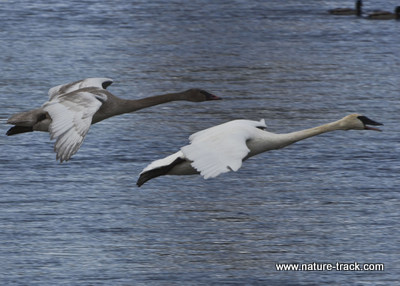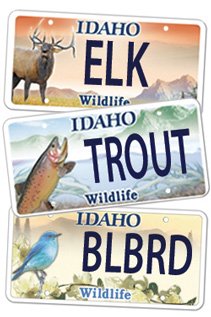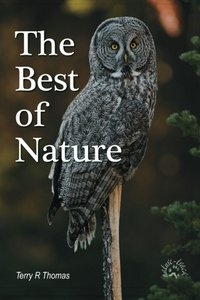Swan Safe Project
Plugging a Hole in the Bucket

In 2014, 12 trumpeter swans died when they struck a powerline along a single mile stretch. This drain on the swan population can be fixed with your help.
Last winter a short stretch of powerline claimed 12 trumpeter swans in about a three month period. Swans like to winter in the sloughs of this section of Madison County, and often fatally collide with the powerline, creating a needless hole in the swan population bucket.
Huh? Holes in the bucket? What bucket? The leaky bucket analogy is a simplistic model as scientific models go. There are no formulas and it ignores complex interactions. Yet, it is its very simplicity that makes it useful and understandable, perfect for education. It is easy to grasp the almost financial basis of: production minus costs equals profit. If production exceeds costs, there is a surplus. If costs exceed production, there is no profit and carried further, can lead to the red ink side of the ledger.
The leaky bucket model, as taught to hunter education students is this: A wildlife population is water that is poured into a bucket or production. The bucket itself can represent the available habitat for that species.
The faster water is added, the faster the bucket fills. However, there are holes in the bucket that drain away the water (population). The holes represent predation, natural accidents, diseases, and winterkill which may shape populations through survival of the strongest animals (and their genes), and man-caused accidents such as powerline and fence strikes, electrocutions, entanglements, highway collisions and more. In a given bucket, holes may be large or small, few or many.
If the water coming in the top of the bucket exceeds what is lost via the collection of holes, the population increases and begins to overflow. This is the profit: a harvestable surplus, or animals that can migrate and pioneer new habitats. It doesn’t matter how many holes are in the bucket so long as production exceeds leakage.
It is easy to understand that if the bucket shrinks, the population shrinks. But if the size of the holes remains the same, the smaller bucket empties more quickly. When the leaks equal the rate water is poured into the bucket, there will be no surplus regardless of bucket size.
Worse, if the leaks exceed the rate the water comes in—deaths exceed births or recruitment—the population shrinks until some lower, sub-equilibrium is reached or until some of the holes are plugged. The bucket could potentially hold more but the leaks won’t let it.
The size of the habitat bucket continues to shrink for most wildlife species making the proportionate losses to manmade causes ever greater. That makes it very important to plug unnecessary leaks that squander wildlife resources.
The swans lost to the powerline point to a hole in the swan bucket that can be permanently plugged. There is an effort underway to work with the power company to bury that line underground and provide safer skies for the swans. If you would like to find out how you can help, check out this website: www.crowdrise.com/swansafe.

Wildlife License Plates
Great news! as of 2024, there are three NEW designs for license plates. They still are bluebird, cutthroat trout and elk, but they are beautiful.
Idaho Wildlife license plates provide essential funding that benefits the great diversity of native plants and wildlife that are not hunted, fished or trapped—over 10,000 species or 98% of Idaho’s species diversity. Game species that share the same habitats (such as elk, deer, antelope, sage-grouse, salmon, trout) also benefit from these specialty plates.
No state tax dollars are provided for wildlife diversity, conservation education and recreation programs. Neither are any revenues from the sale of hunting or fishing licenses spent on nongame species. Instead, these species depend on direct donations, federal grants, fundraising initiatives—and the Idaho Wildlife license plates.
Both my vehicles have Bluebird Plates. I prefer the bluebird because the nongame program gets 70 percent of the money from bluebird plates, but only 60 percent of the money from elk and trout plates - 10 percent of the money from elk plates supports wildlife disease monitoring and testing programs (to benefit the livestock industry) and 10 percent from cutthroat plates supports non-motorized boat access.
Incidentally, in 2014, the Idaho Legislature denied the Department of Fish and Game the ability to add new plates or even to change the name of the elk and cutthroat plates (very specific) to wildlife and fish plates, a move that would have allowed for changing images occasionally and generating more revenue. It would seem that they believe that we Idahoans don't want a well funded wildlife program.
I think it is time we let the Legislature know that Idahoan support wildlife funding and that we would like to see these generic plates come to fruition.

"WOW. What a phenomenal piece you wrote. You are amazing." Jennifer Jackson
That is embarrassing, but actually a fairly typical response to my nature essays. Since The Best of Nature is created from the very best of 16 years of these nature essays published weekly in the Idaho Falls Post Register (online readership 70,000), it is a fine read. It covers a wide variety of topics including humorous glimpses of nature, philosophy, natural history, and conservation. Readers praise the style, breadth of subject matter and my ability to communicate complex and emotional topics in a relaxed and understandable manner.
Everyone can find something to love in this book. From teenagers to octogenarians, from the coffee shop to the school room, these nature essays are widely read and enjoyed.
Some of the essays here are my personal favorites, others seemed to strike a chord with readers. Most have an important message or lesson that will resonate with you. They are written with a goal to simultaneously entertain and educate about the wonderful workings of nature. Some will make you laugh out loud and others will bring a tear to the eye and warm your heart.
Readers Write:
"You hit a home run with your article on, Big Questions in Nature. It should be required reading for everyone who has lost touch with nature...great job!" Joe Chapman
"We enjoyed your column, Bloom Where Planted. Some of the best writing yet. The Post Register is fortunate to have your weekly columns." Lou Griffin.
To read more and to order a copy, click here or get the Kindle version
Copies are also available at:
Post Register
Island Park Builders Supply (upstairs)
Barnes and Noble in Idaho Falls
Harriman State Park, Island Park
Museum of Idaho
Valley Books, Jackson Wyoming
Avocet Corner Bookstore, Bear River National Wildlife Refuge, Brigham City, Utah
Craters of the Moon National Monument Bookstore, Arco, Idaho